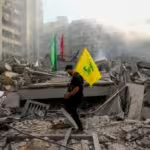As tensions with Iran rise, the UK’s Foreign Secretary, David Lammy, is said to be planning on visiting Israel to assist in the prevention of a broader conflict in the Middle East. On the trip, as reported in Sky News, he is likely to sit down with Israel’s Prime Minister Benjamin Netanyahu, Foreign Minister Israel Katz, and French counterpart Stéphane Séjourné.
However, the FO still needs to send an official confirmation regarding the visit. Replying to an email sent to him, the FO spokesperson said that Lammy’s intentions of visiting were standard procedure and that the media would learn about it via conventional channels. However, in a statement on Thursday, Lammy supported the reopening of ceasefire talks and the release of hostages in Gaza.
“This is the moment when the future of the Middle East is going to be determined,” Lammy said, pointing to the hours and days ahead. He recognized the dire condition in Gaza first of all, emphasizing the recent attack on the al-Tabeen school, which is quite telling of the fact that there is no refuge for Palestinians.
“These talks are a chance that is about achieving an immediate cease-fire regime at the grounds of the identification of civilian population of Gaza, setting the provisions for the release of the hostages that remain in the hands of Hamas, and the stabilization of the situation, which indeed is highly important at the present stage for the Middle East,” Lammy said.
He also sought to be confident that the UK would persist in using every diplomatic approach to ensure a cease in the fighting. Lammy also pointed out that in the previous week, he had communicated with the different regional actors to express the need to work to cease the conflict. Similarly, the UK Prime Minister has discussed the issue with the US, French, and German presidents, Iran, and the Egyptian President.
Lammy also underlined some practical benefits of the ceasefire, including its capacity to prevent the killing of civilians but also to help wider de-escalation and possibly a more stable Middle Eastern region.
The region has experienced better petroleum prices after Iran blamed Israel for the extra-judicial killing of Ismail Haniyeh, the political great of Hamas in Tehran. Israel has not admitted or rubbished reports of being behind the incident.
Iran’s new president, Masoud Pezeshkian, condemned the West for failing to react to what he referred to as “unprecedented inhumane crimes” in Gaza and other Israel actions in the Middle East, arguing that its silence provided Israel with the green light to compromise regional and international security.
On Thursday, UN Human Rights Head Volker Türk drew the attention of the international community to the precariousness of the situation in Gaza: According to him, the number of dead people has exceeded 40000, which Turk called a ‘grim statistic’ of an ongoing conflict.














